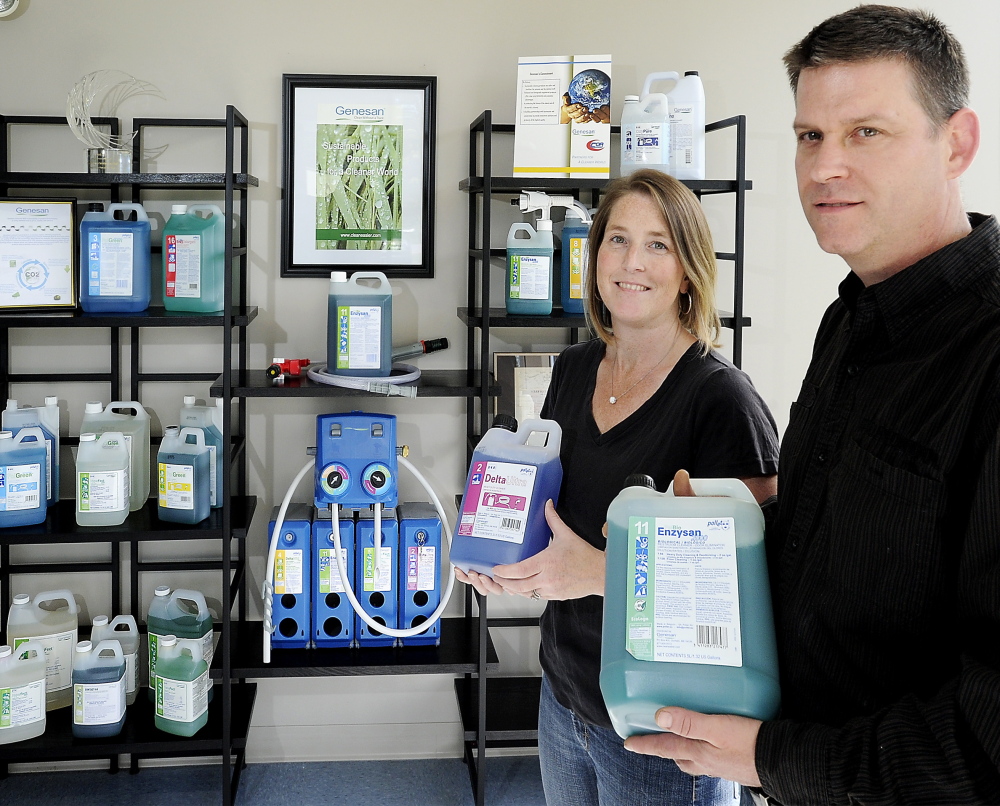Of the 50 states, Maine has the third-highest concentration of jobs in the “biobased products” industry, which seeks to replace petroleum products with those made from renewable resources such as plants. But it has the potential to create many more.
That’s the finding from a report from the U.S. Department of Agriculture issued last week, part of a USDA campaign to promote the biobased products industry, saying it offers a way to bring manufacturing jobs back to states with abundant natural resources such as Maine.
“You can rebuild a rural economy … looking for ways in which (natural) products can be used to replace petroleum products,” U.S. Secretary of Agriculture Tom Vilsack said Friday in a telephone interview with the Maine Sunday Telegram.
The USDA report calculated the percent of state employment in the biobased products industry divided by the percent employment in the same industry in the U.S. It found that in Maine, the industry employs about 2.4 times more workers than the national average. Only Mississippi and Oregon have higher concentrations of jobs in the biobased products industry, according to the report.
Vilsack said Maine’s diverse landscape, massive forested areas and abundant agricultural lands have contributed to the prevalence of companies making such products.
Those companies include Genesan LLC, a Gorham-based company with about 50 local employees that distributes janitorial products made out of grasses, rapeseed and other plants. Comparable cleaning solutions are made from petroleum byproducts, Genesan product specialist Steven Powers said.
Demand for nontoxic, biodegradable products is on the rise, according to Genesan spokeswoman Arien Chason.
“Everyone’s looking for something that they feel comfortable having their kids around, or their pets,” she said.
In addition to job statistics, the USDA report also contains information about its BioPreferred program, which certifies products as biobased. So far, about 20,000 products nationwide have qualified for the program, including 14,000 products that are included in a mandatory federal purchasing initiative.
“The BioPreferred program enables purchasers to find and compare products, such as cleaners, lubricants and building materials, including carpet and insulation, from all participating manufacturers, thus, encouraging manufacturers to compete to provide products with higher biobased content,” the report says.
In all, 10 Maine companies belong to the BioPreferred program, according to the USDA’s BioPreferred.gov website.
One of the best-known BioPreferred companies in Maine is Biovation LLC in Boothbay, which makes a variety of products using nonwoven, biodegradable fabrics derived from cornstarch. Those products include sanitary wipes, bandages, boot-drying inserts, packaging materials and antimicrobial shields for blood pressure cuffs.
Biovation CEO Kerem Durdag said one of the company’s challenges is lowering the cost of biobased products. As of now, Biovation’s products cost more than comparable goods made of plastic and other synthetic materials.
“It’s a healthier alternative, but it’s also more expensive,” he said.
Still, Durdag said a growing number of businesses and organizations, especially in Europe, are willing to pay a premium for products that are safer, better for the environment and don’t deplete the world’s oil supply.
There is a growing sense of awareness about biobased products in the U.S., he said, but most companies still balk at the notion of paying more for a biobased product.
“Closing the cost gap is important,” Durdag said.
Vilsack said consumers tend to understand why it is better to buy products made from materials grown in the U.S. rather than extracted from a foreign oil well. He said there are tremendous opportunities for growth in the biobased products industry, which is constantly innovating.
One product that Vilsack believes could be manufactured in Maine on a large scale is cross-laminated timber, a building material made of pressed and glued wood that is more comparable in strength to steel and concrete.
Vilsack said cross-laminated timber can be used to build structurally sound buildings as tall as 30 stories that are more resistant to fire and heavy winds than structures made of traditional materials.
He said leaders in Maine should focus their economic development efforts on boosting the production of cross-laminated timber and other biobased products in the state.
“It’s just an unlimited opportunity,” Vilsack said.
Send questions/comments to the editors.




Success. Please wait for the page to reload. If the page does not reload within 5 seconds, please refresh the page.
Enter your email and password to access comments.
Hi, to comment on stories you must . This profile is in addition to your subscription and website login.
Already have a commenting profile? .
Invalid username/password.
Please check your email to confirm and complete your registration.
Only subscribers are eligible to post comments. Please subscribe or login first for digital access. Here’s why.
Use the form below to reset your password. When you've submitted your account email, we will send an email with a reset code.